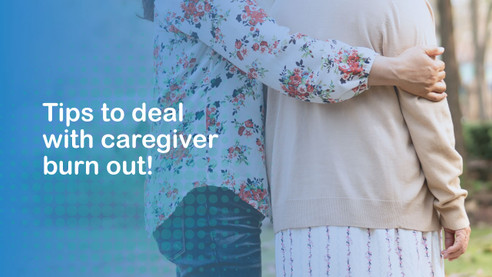2021 Jul 29th
Caregiver Burnout
A caregiver is someone who takes care of a close family member or friend who may have medical or personal issues. It could be helping with simple tasks like meal prep, cleaning up their living space, running errands, or just being there emotionally for someone.
Being a caregiver for someone, especially for someone who is very close to you, can be both rewarding and overwhelming. It can become difficult both mentally and physically. It can cut into your social life and your work life making things financially tight. It is important while taking care of your loved one that you take care of yourself too.
Caregiver burnout can occur quickly or gradually over time when the stress and the pressure of making sure your loved one is taken care of becomes overwhelming. As a caregiver, you may feel exhausted, alone, overworked, and underappreciated. It is very important to recognize when these signs start to show. It is important to address them as they come instead of covering them up or telling yourself you are ok. The more the burnout progresses the higher the chance of you not being able to provide the care you are capable of and the care your loved one deserves.
Recognizing the signs…
You may start to feel and see signs of burnout. You might feel some of these signs all at once or slowly over a period of time.
Many of the signs are
- Exhaustion
- Depression
- Anxiety
- Pushing your own health and mental state to the side
- Losing interest in your hobbies or things you once really cared about
- Feel like you are losing control of everything around you
The emotional side to caregiver burn out might start with something as mild as a feeling anxious, being irritable or upset and might not be so easy to recognize. It can quickly turn into physical pain, such as headaches. Becoming either very tired or the total opposite of not being able to sleep are very common. Losing any interest in eating, bathing or chatting with friends can quickly creep up without you even noticing.
Getting Help…
Remember, it is ok to ask for help. Asking another close family member or friend to help out in any capacity is ok. There are a lot of volunteer programs and support groups throughout the community who are dedicated to helping caregivers. Recognizing the signs and symptoms is very important in preventing burnout from progressing. A healthy diet, exercise and interaction with friends and family are also important in helping maintain your mental health. Reaching out to your loved ones doctor and asking for possible outside care to help you have a break. Sometimes all you need is a bit of time to rest, asking a family or friend to come and sit with your loved one while you have a short break can really help.
Things To Remember
It is very easy to get consumed by your surroundings when you are caring for someone you love, but being alert and watching for signs you are burning out is going to be beneficial to everyone in the long run. You want to make sure that you are giving the best care possible and that starts with your own mental and physical well being.
- Ask friends and family to help with simple tasks (a meal, a load of laundry or just keeping you company)
- Ask your loved ones doctor for help, ask for numbers of support groups for caregivers and volunteer programs who can help care for you and your loved one.
- Recognize when you are becoming tired, sick or anxious before it gets out of control.
Caring for a loved one in their time of need can be very rewarding. You are taking the time to help them in their time of need but always remember to take care of yourself too. Making sure you are taken care of is going to allow you to care for your loved one the way they deserve.

